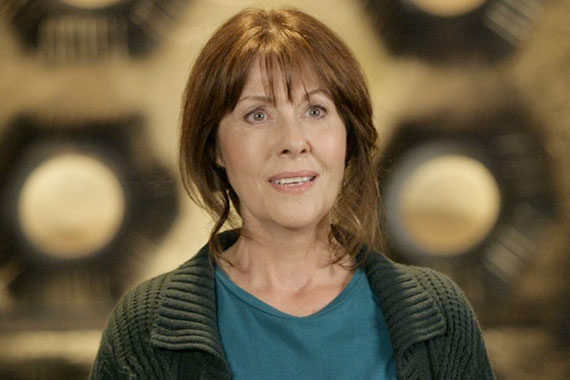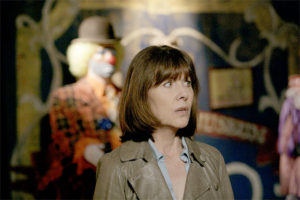Why I Love Sarah Jane Smith

On her date of birth David Selby celebrates Elisabeth Sladen’s iconic companion.
Mr Smith becomes human, played by his original voice-actor, Alexander Armstrong. The Thirteenth Floor isn’t a Wizards vs. Aliens story because The Sarah Jane Adventures did it first. The Trickster comes back. Sky is revealed as the Trickster’s daughter. Bannerman Road is destroyed. Clyde and Rani leave together.
 These are just some of the events that would have panned out during Series Five, the most ambitious and memorable Sarah Jane Adventures series to date – had Elisabeth Sladen not sadly passed away at only sixty-five, leaving her husband and daughter along with thousands of fans mourning perhaps the most heart-breaking tragedy in Doctor Who’s history.
These are just some of the events that would have panned out during Series Five, the most ambitious and memorable Sarah Jane Adventures series to date – had Elisabeth Sladen not sadly passed away at only sixty-five, leaving her husband and daughter along with thousands of fans mourning perhaps the most heart-breaking tragedy in Doctor Who’s history.
But that’s enough about death. There’ve been numerous articles, here and across the internet, which have taken the form of beautiful, heartfelt and personal tributes to the late actress. I’d like this, on the day of Sladen’s birth, to be something else: a celebration.
The danger of pathos is the draining effect it has on optimism. Especially here, where there’s so much to celebrate about the character of Sarah Jane Smith. And for every tear that’s been shed, I like to imagine that we can each look back on our favourite adventure with her and smile.
Of course, it’s no secret that Sarah Jane has ascended to a position of godhood within the Doctor Who fandom. Many fans feel this is unwarranted – Sarah Jane was one of many companions who travelled with the Doctor. What is it that makes Sarah Jane so special, to me, as one of her biggest fans? I’ve got a plethora of suggestions.
 The first is that she’s long-serving. A lot of companions have been long-serving, making the transition, as Sarah Jane did, between two Doctors. It was School Reunion that took this a step further, bringing Sarah Jane into the modern era, as a companion who was able to bridge both two regenerations and, now, two distinct styles of Doctor Who storytelling.
The first is that she’s long-serving. A lot of companions have been long-serving, making the transition, as Sarah Jane did, between two Doctors. It was School Reunion that took this a step further, bringing Sarah Jane into the modern era, as a companion who was able to bridge both two regenerations and, now, two distinct styles of Doctor Who storytelling.
What I think is so impressive here is how she fitted seamlessly into both – in an audience surrogate sense, she was an ordinary fan of the show back in her day; 2006 saw her acting symbolically as a fan who’d returned to the show after a change. The clash of Rose and Sarah Jane was like conflict between a ‘new’ fan who thinks the show is about them and an old fan who resents the changes in the show and the evolution of the fandom. In the end, both were able to abandon their preconceptions and embrace, despite their differences, what they loved about the Doctor – or, to suit my metaphor, the show.
The second suggestion that comes to mind is her contextual relevance. ‘Classic’ Sarah Jane embodied bold feminist values, but not a forceful, misandrist set. Sarah Jane respected the men around her but rejoiced in seeing discriminatory remarks disproven. A particular favourite is The Seeds of Doom, but if you haven’t seen it, I’ll leave you to do your research. Sarah Jane was able to question, help, change and even criticise the Doctor, being debatably the first companion to fill the shoes of Barbara Wright in terms of her acumen, creativity and moral integrity.
 Then there’s a familiar tradition within great storytelling, which is to push a character’s personal boundaries. Sarah Jane had a few moments that went against what we’d expect by confronting her with something formidable enough to have an impact on her character: the deaths of her parents in The Temptation of Sarah Jane Smith, and her childhood nightmare in Day of the Clown, to name a couple.
Then there’s a familiar tradition within great storytelling, which is to push a character’s personal boundaries. Sarah Jane had a few moments that went against what we’d expect by confronting her with something formidable enough to have an impact on her character: the deaths of her parents in The Temptation of Sarah Jane Smith, and her childhood nightmare in Day of the Clown, to name a couple.
Yes – it was The Sarah Jane Adventures which was able to put Sarah Jane in situations which would test the character and her morality. And the charm of Sarah Jane, like any good hero, is that for all she made mistakes, she was still restored to the same hero-figure we all knew and loved by the end. In her first episode, Invasion of the Bane, she desperately tried to seclude herself from the rest of the street with her cold and impolite conduct, but soon her naturally friendly, loving side came through. Even in her darkest and harshest moments, like her rejection of Maria in The Lost Boy, her motives were apparent to the viewer as simply wanting to do the right thing.
It’s one thing to be a good person when you’ve got everything you could want. It’s another to live a life entrenched in tragedy and still be an inspiration to those around you. Elisabeth Sladen communicated this cordiality and constancy throughout all of her performances. Sarah Jane was the kind of person who you wanted to be around.
So when someone asks me why I love Sarah Jane so much, my answer is defined by the subjectivity of the question. Little boys love the Doctor because he’s a hero who doesn’t need a gun or a superpower to save the world. Grown men love the Doctor because that role-model formed the people they are today. I love Sarah Jane because she’s inquisitive, adventurous and flawed – everything I am – but she’s also admirably brave, compellingly warm and relentlessly good. And I can safely say, based on that, that I am all the better as a human being for having her in my life.








